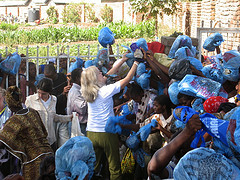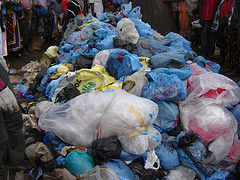 When my friend, and fellow writer, Lori Robinson, was seven years old and living in Miami, Florida, she told her mom she wanted to go live in Africa.
When my friend, and fellow writer, Lori Robinson, was seven years old and living in Miami, Florida, she told her mom she wanted to go live in Africa.
Little did she know her childhood dream would turn into a lifelong passion, and culminate several decades later in a simple, yet exhilarating project: The Bag Project.
Lori was twenty-four when she finally made her way to Africa. She’d originally planned to work in wildlife conservation, but her good looks launched her into the world of modeling and television. For three and a half years she dazzled the camera during photo shoots and also hosted South Africa’s most popular live entertainment television show, Prime Time.
It may have been Lori’s modeling career that first opened the doors of Africa for her, but it was her heart that took her back again and again.
 Over the past thirty years Lori has traveled extensively throughout the continent and has been deeply involved in the Jane Goodall Institute (JGI). Currently she travels twice each year from her home in Santa Barbara, California to East Africa where she leads tours and also participates in volunteer work with JGI.
Over the past thirty years Lori has traveled extensively throughout the continent and has been deeply involved in the Jane Goodall Institute (JGI). Currently she travels twice each year from her home in Santa Barbara, California to East Africa where she leads tours and also participates in volunteer work with JGI.
For part of her stay, she resides in the small town of Tenguru, Tanzania. It’s here that Lori has made an impact on the lives of thousands of Tanzanians with her Bag Project.
Watch this short video to see Lori’s project in action.
“The simplicity of it, is what makes it work,” she says as she flashes a quick smile.
“It began six years ago when I was in Tenguru and noticed a problem plaguing the beautiful landscape; plastic bags were everywhere. They were blowing in the wind, tangled in the trees and fences, stuck in rivers. They were strangling the environment.
“Not only that, but grazing goats and cows were also eating the bags, and frequently dying as a result—a devastating loss for a family who relied on the animal for its daily milk. It was a really big problem.
“Another issue is that stagnant water collects in the folds of discarded bags and is known to breed mosquitoes carrying malaria,”
Lori estimates that nearly every person in rural Tanzania uses and tosses out one plastic bag each day. That may not sound like a lot, but when you understand that most villages do not have trash pick-up or recycling, that means all these bags are drifting in the environment.
Her solution? Simple. Canvas tote bags.
 Lori has collected tens of hundreds of tote bags in the U.S. and taken them to Tenguru, where until now they had been virtually non-existent. In 2005 she brought over her first shipment and set up a stand at a local marketplace where she distributed them. Her only requirement? Each person had to collect at least twenty-five plastic bags and bring them to her in order to receive a free canvas tote bag.
Lori has collected tens of hundreds of tote bags in the U.S. and taken them to Tenguru, where until now they had been virtually non-existent. In 2005 she brought over her first shipment and set up a stand at a local marketplace where she distributed them. Her only requirement? Each person had to collect at least twenty-five plastic bags and bring them to her in order to receive a free canvas tote bag.
Lori was astounded by the response. She was literally mobbed. During her latest trip in February, she distributed 1,100 canvas bags in two hours–all to members of the community who had proudly helped cleaned it up. Some had even walked ten miles to receive one. It’s a win-win for everybody. “Totes that might otherwise end up in our garbage dumps in U.S. are replacing plastic bags that would otherwise end up on the roadsides of Africa,” Lori says.
 Lori has personally received and transported over 33,000 plastic bags to the Arusha, Tanzania dump. Even more exciting is that now well over a thousand people are equipped with canvas bags, which means these shoppers will no longer be adding plastic bags to the environment. She estimates that in the next year they will save the region more than 400,000 plastic bags.
Lori has personally received and transported over 33,000 plastic bags to the Arusha, Tanzania dump. Even more exciting is that now well over a thousand people are equipped with canvas bags, which means these shoppers will no longer be adding plastic bags to the environment. She estimates that in the next year they will save the region more than 400,000 plastic bags.
I asked Lori to tell me what surprised her most about her bag project, and this is what she said:
“The most wonderful and surprising thing is how easily everything fell into place. The inspiration of giving totes in exchange for litter, getting the thousands of totes through customs, getting the message spread in the village that I was doing this project—there were so many pieces to the project that seemed like potential obstacles, yet nothing got in the way. I am also wonderfully surprised by all the people here who have taken this project on to collect totes, give money, and spread the word. It has been so great to watch the project touch others to be called to act. I often say it was divinely inspired because I was completely in line with what I was supposed to do. When that is the case, things happen effortlessly.”
Lori believes Tenguru could become a model of progressive, sustainable living for rural Africa. She will be going back in January and August 2012 with more totes.
When I asked her how somebody could help or get involved, she said:
The best way to help right now is to:
• Share the video so others can see how damaging plastic is to the environment.
• Travel with Lori to Africa on one of her Trips with a Cause (www.africainside.org).
• Donate money for extra luggage fees, garbage dump fees (for all the litter collected), and for paying people on the ground in Tanzania who help make this project so successful.
Click on this link to make a donation: http://www.crowdrise.com/africaInside/fundraiser/africabagproject
Or donations can be made to the Tribal Trust (a non profit accepting donations on behalf of this project) and sent to Lori Robinson at PO Box 31199, Santa Barbara, CA 93130.
If you ever doubted that one person could make a difference, Lori is living proof. I hope you will help support her project in whatever way you can.
